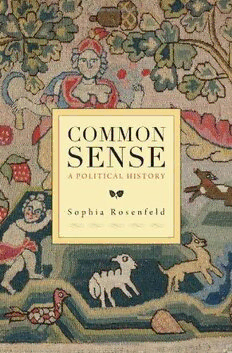
Common Sense: A Political History PDF
Preview Common Sense: A Political History
Common Sense Common Sense A Po liti cal History a Sophia Rosenfeld Harvard University Press Cambridge, Massachusetts • London, En gland 2011 Copyright © 2011 by the President and Fellows of Harvard College All rights reserved Printed in the United States of America Library of Congress Cataloging- in- Publication Data Rosenfeld, Sophia A. Common sense : a po liti cal history / Sophia Rosenfeld. p. cm. Includes bibliographical references and index. ISBN 978- 0- 674- 05781- 4 (alk. paper) 1. Po liti cal science— History—18th century. 2. Paine, Thomas, 1737– 1809. Common sense. 3. United States— Politics and government—1775– 1783. 4. France— Politics and government—1789– 1799. 5. Democracy—U nited States. I. Title. JA83.R724 2011 320.01'1—dc22 2010038504 Contents Introduction 1 1. The Ghost of Common Sense London, 1688– 1739 17 2. Everyman’s Perception of the World Aberdeen, 1758– 1770 56 3. The Radical Uses of Bon Sens Amsterdam, 1760– 1775 90 4. Building a Common Sense Republic Philadelphia, 1776 136 5. Making War on Revolutionary Reason Paris, 1790– 1792 181 6. Königsberg to New York The Fate of Common Sense in the Modern World 221 Notes 259 Ac know ledg ments 321 Index 325 Common Sense Introduction The familiar, precisely because it is familiar, is for that very reason unknown. G. W. F. Hegel, Phenomenology of Spirit Hot things can burn you. Two plus two make four. Seeing is believing. Blue is diff erent from black. A leopard cannot change its spots. If I am writing these words, I exist. There are many reasons not to write a book about common sense, es- pecially if you happen to be a historian. For one, common sense is, by defi nition, ahistorical terrain. In modern parlance, we sometimes use common sense to mean the basic human faculty that lets us make elemen- tal judgments about everyday matters based on everyday, real- world expe- rience (e.g., If you used your common sense, you would know the princi- ples stated above!). Other times we mean the widely shared and seemingly self- evident conclusions drawn from this faculty, the truisms about which all sensible people agree without argument or even discussion, including principles of amount, diff erence, prudence, cause and eff ect. Either way, common sense is supposed to defi ne that which is the common property of all humans regardless of the variance of time or space.1 If that is not problem enough, the tenets of common sense are ostensi- bly so banal, so taken for granted, that they generally go without saying. On the rare occasions when they are explicitly stated as such, it is, nor- mally, only to counter perceived violations. The rest of the time, the
